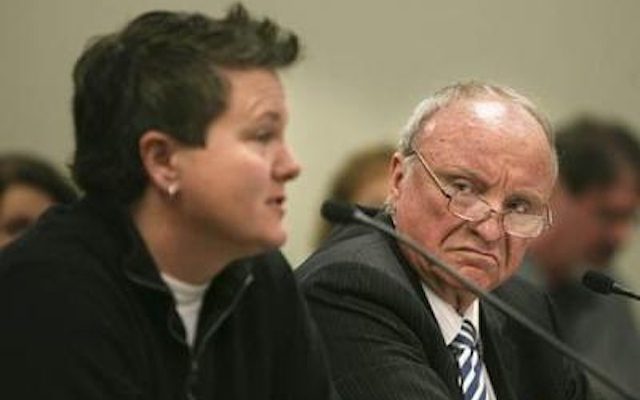
I occasionally miss living in Utah. One of those times is when a state senator refers to an unpleasant bill as a “black baby — a dark, ugly thing,” apologizes to blacks for his remarks but makes a reference to lynch mobs in the apology, and then exasperatedly refers to African-Americans as “those people.”
As a satirist, I have occasionally tried to make up characters as befuddled and clueless as Sen. Chris Buttars (R-West Jordan), but I’ve never come up with anything this funny. Here’s what happened: On Feb. 12, while debating a school-funding bill, one state senator called it “the ugly baby bill,” i.e., a thing nobody wants. Playing off that little joke, Buttars said, “This baby is black, I’ll tell you. This is a dark, ugly thing.”
In Buttars’ defense, both “black” and “baby” have multiple meanings. “Baby” can be a slang term to mean any object — as in, “Man, this baby is ugly!” or “Let’s set that baby on fire!” Also in Buttars’ defense, he’s 65 years old and has lived in Utah his entire life. It’s quite possible he’s never even seen a black baby.
The problem is, the other senator called it “the ugly baby bill,” obviously using “baby” in the sense of “a human infant.” The debate had also included references to the biblical story of King Solomon offering to split a baby in half. So when Buttars called this “baby” black, dark, and ugly — well, he didn’t leave a lot of wiggle room there for alternate meanings.
Buttars said later that day that he didn’t intend for his remark to have racist overtones, but that he could see how people could take it that way, and he apologized. But the damage was already done. It didn’t help that in 2006, he told a radio interviewer that Brown v. Board of Education — the landmark Supreme Court case that did away with segregation in schools — was “wrong to begin with.” With that already on his record, Utah’s civil rights and minority groups were quick to condemn him over the black baby incident. Many people all over the state called for his resignation. I don’t know if Jesse Jackson and Al Sharpton made official statements, but I assume they at least knew about it, since an alarm goes off in their bunker any time the word “black” is used in public.
After a week of lying low, Buttars granted The Salt Lake Tribune an interview on Feb. 18. During this interview, he expressed disbelief at how vitriolic the attacks against him had gotten. “I thought … the first couple days, ‘Well you’re getting beat up but you deserve it, you made a mistake.’ But then they started getting meaner and meaner and meaner to the point it is just a hate lynch mob.”
Oh, Buttars. Buttars, Buttars, Buttars. You’re in the middle of a highly emotional controversy about a perceived racial slur you made — and then you use the term “lynch mob”? What is the matter with you? Again, I grant you, the word “lynch” does not automatically refer to mobs of Klansmen who killed hundreds of blacks in the United States in the 19th and 20th centuries. But surely you are aware that the term is frequently, perhaps even predominantly, associated with such infamy, and that it has recently been discussed in highly public forums. Surely you know that the term “lynch mob” has very specific connotations for African-Americans. (Remember? The people you were trying to apologize to?)
Then again, maybe he doesn’t know that. After that remark fanned the flames even higher, he told the Tribune, “Lynch mob is a Western term. You wouldn’t find one person in 10,000 in Utah that thinks that’s a racist term…. That’s not a racial term in my opinion.” And then the clincher:
“How do I know what words I’m supposed to use in front of those people?”
At this point everyone stopped being angry and just sort of shook their heads and sighed. The prospect of explaining to a 65-year-old man why the term “those people” might be problematic in this context was wearying at best.
What Buttars has amply proven throughout all this is that he simply doesn’t think before he speaks, and possibly not even after. That’s not a crime, and he’s certainly not the first politician to suffer from foot-in-mouth syndrome. So why did this become such a big deal? Because a lot of Utahns already thought he was a jerk, and now they had something solid to hold against him. It was like arresting Al Capone for tax evasion: not his worst offense, but we’ll take what we can get.
Buttars, first elected in 2000, takes all his marching orders from Gayle Ruzicka, president of the Utah chapter of the ultra-conservative Eagle Forum. Buttars is a Ruzickatista, one of her flying monkeys that do her bidding to make sure the Utah legislature passes plenty of laws governing “morality” and “decency,” defined here as “things Gayle Ruzicka agrees with.”
He’s in favor of outlawing abortion. He would make exceptions for cases where the mother’s life is threatened — but only if it’s her life at stake, not merely her health. He said in 2007, “If you just consider the health of the mother, is it ‘Will she just be tired more often?’ or is it something much more serious in the ladder of health deterioration?” Because as you know, the main reason the liberal media is always encouraging women to have abortions is that they hate listening to pregnant women whine about how tired they are. No more of those hasty, tiredness-alleviating abortions under Chris Buttars’ watch!
He’s against the teaching of evolution in schools and has frequently mentioned how evolution teaches that we descended from monkeys … which means, after all, that he actually has no idea what evolution teaches. He wants only abstinence to be taught in sex-ed classes, and is furiously opposed to Planned Parenthood being involved in any way, lest the students learn how to avoid catching STDs. I assume he figures that if students aren’t going to be abstinent, it’s only fair that they get gonorrhea as punishment. (I assume.)
It’s the gays that Buttars has targeted most often. He’s got a real problem with them. A few weeks ago he led the charge when the Salt Lake City council unanimously approved a new system that would allow unmarried couples (gay or straight) to prove they live together and depend on one another financially. This registry would serve as a resource for businesses when determining whether to issue insurance benefits. It’s a way to go “on the record” about living together and being financially intertwined without actually getting married. Buttars opposes the registry on the grounds that if we’re going to start collecting the names and addresses of gay people, it should be to exterminate them, not give them insurance benefits.
No, I have exaggerated. Buttars opposes it because in his mind it’s too close to a “civil union” or a “gay marriage” — never mind that about 75 percent of those who would benefit from the registry are straight unmarried couples. Buttars went so far as to call the registry “repugnant,” though he stopped short of calling it a “gay, ugly baby.” Why, if people who depend on one another financially are allowed to share one another’s insurance benefits, then the next thing you know heterosexual marriage will be outlawed and only gays will be allowed to vote.
You might think that Buttars is overreacting, and that people sharing each other’s insurance benefits has no impact whatsoever on him or anyone else. But that’s just what the gays WANT you to think. The fact is, insurance benefits are one of the major reasons that people choose to be gay. They see all those perks waiting for them, and they figure that while it’s going to be tough to retrain themselves to be attracted to members of the same gender, it will be worth it to get those insurance bennies. But by taking a clear stand against such perks, Utah sends a message to its citizens, and that message is: Don’t be gay! It will avail you nothing. And the result is that over time, fewer and fewer Utahns will choose to be gay, and eventually the state will have an entirely straight population, and all the community theaters will close, and there won’t be any more “American Idol” contestants from Utah, but I think you’ll agree that’s a small price to pay.
Anyway, the state legislature had hearings about this registry thing, and local lesbian Christie Gleave testified about how she was unable to visit her partner in the hospital because she wasn’t on her insurance. On Feb. 12 — the same day that Buttars would make his fateful “black baby” statement — The Salt Lake Tribune ran a photo of Gleave speaking as Buttars looked on, and the expression on Buttars’ face would appear to speak volumes.

Now, I don’t know exactly what was happening when this photo was taken. Maybe Buttars was in the middle of a belch. Maybe Gleave was saying something particularly vile, like “I want all of you to imagine Chris Buttars naked,” or “I stand outside of preschools and recruit young girls to become lesbians,” or “I vote for Democrats.” Maybe in context the look on Buttars’ face is entirely appropriate, the same reaction you or I would have had. I don’t know. All I know is that out of context, it looks like an expression of pure, unfiltered hatred. He would appear to have so much contempt for this woman that he can’t even hide it. If looks could kill, the flags at Home Depot would now be flying at half-mast.
So these are hard times for Chris Buttars, who is viewed by many of his constituents as a cranky old bigot. (Of course, to some voters, that’s a selling point.) He says he’s running for re-election in November. We’ll see whether he gets to stay, or whether people use this debacle to finally get rid of him. Personally, I think his career as a state senator has been dark, ugly, and black, just like a Filipino baby.





